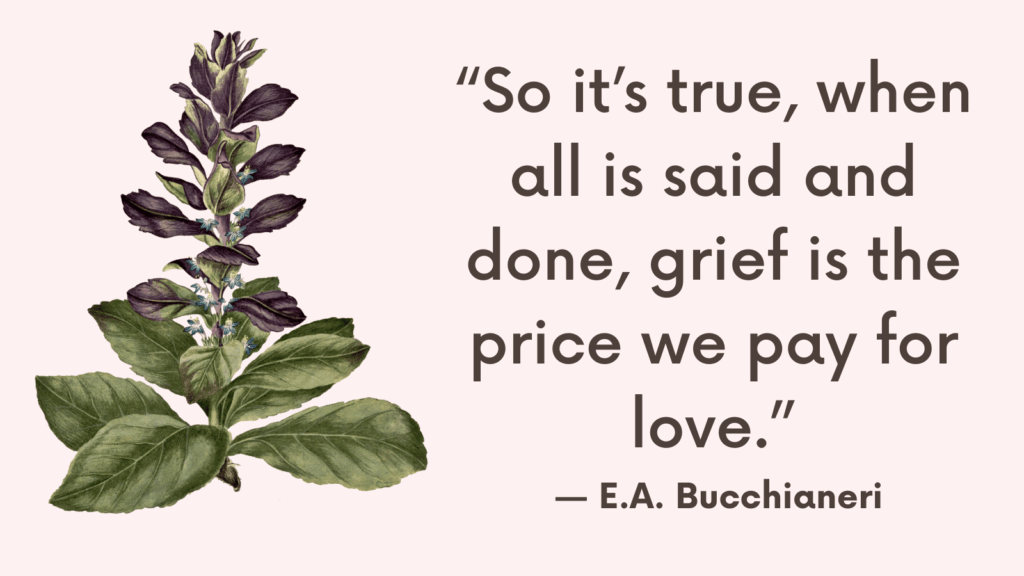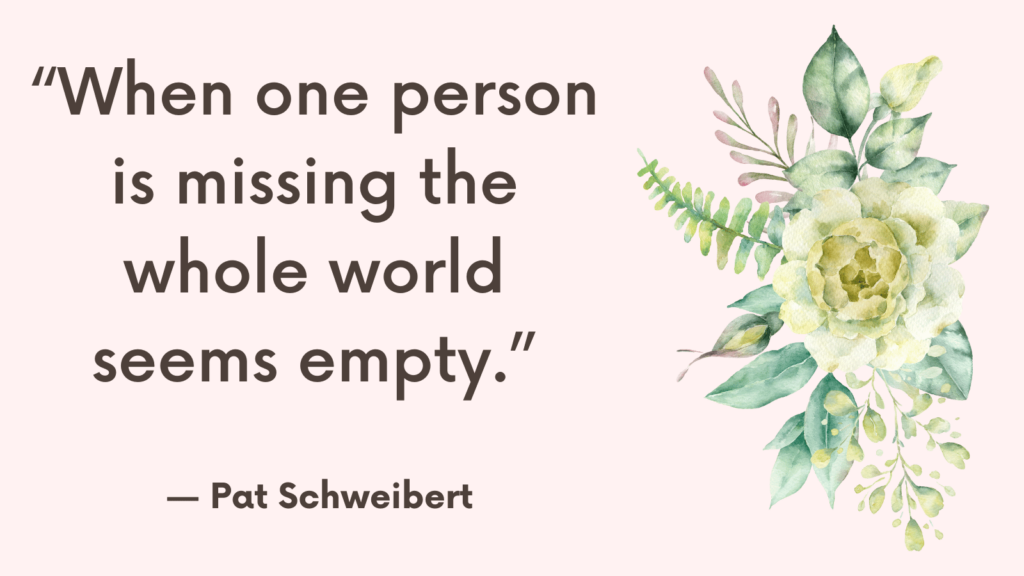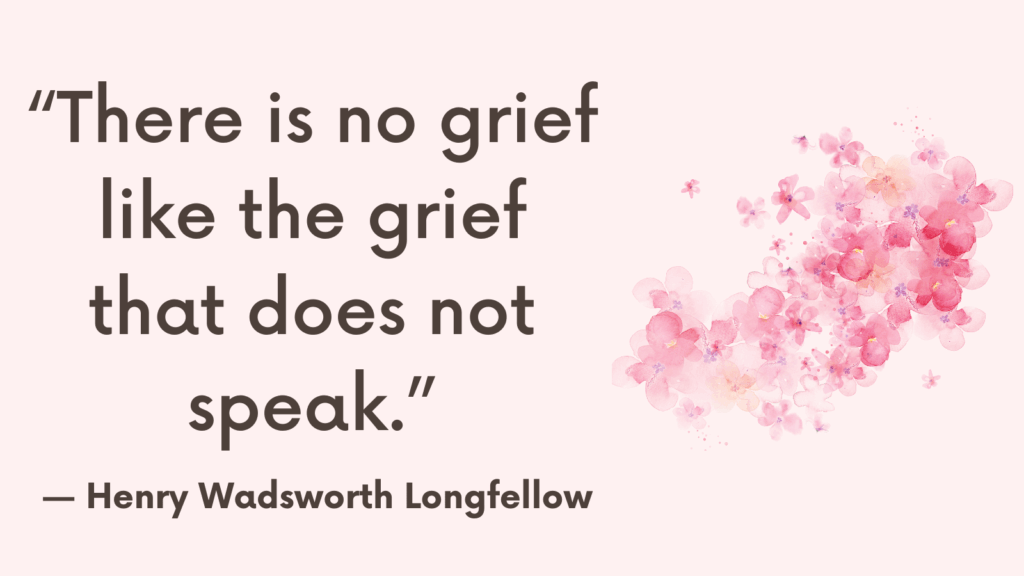In the post, you’ll learn all about transmuting grief into hope.
What Does Transmuting Grief Mean?
Transmuting grief is a process of transforming the pain and sadness of losing someone or something into healing and growth.
It’s a journey that takes time and patience, but it’s possible to turn your grief into a positive force in your life.
Related: Best +30 Grief Activities For Adults (+FREE Worksheets PDF)
6 Stages of Grief
In 1969 Dr. Elisabeth Kubler-Ross proposed 5 stages of grief after working with patients who were dying of cancer.
Although the theory has been expanded and revised over the years, the original 5 stages are still commonly used.
In 1992, Dr. Kenneth J. Doka added hope to the stages of 5 stages of grief. This 6th stage recognizes that many people find it helpful to have something to look forward to after a loved one dies.
Those 6 stages are:
1. Denial: A stage where a person may refuse to accept the reality of the loss and can be in a state of shock or numbness.
2. Anger: A stage where a person may feel angry or frustrated about the situation and might start blaming others for their loss.
3. Bargaining: A stage where a person is willing to make a deal with a higher power in order to reverse the situation.
4. Depression: A stage where a person may feel sad, lonely, and helpless due to their loss. They may even withdraw from social interactions and lose interest in activities they previously enjoyed.
5. Acceptance: A stage where a person starts to come to terms with their loss and learns to live with it.
6. Hope: A stage where a person is finally able to look towards the future with hope, finding meaning in the loss and moving forward with their life.
Related: ACT For Grief and Loss: 6 Powerful Tools and Worksheets to Help You Move Forward with Grief – Acceptance and Commitment Therapy (ACT)
Top 5 Tips On Transmuting Grief Into Hope
#1. Allow Yourself To Feel Your Emotions
Grief is a complex and challenging experience that can bring up a range of intense emotions.
It’s important to allow yourself to feel these emotions, whether they are sadness, anger, frustration, confusion or any other feeling that arises.
It might be tempting to try to bury your emotions or push them aside, but it’s important to remember that it’s normal and healthy to experience a wide range of emotions during the grieving process.
Allow yourself to cry if you need to, talk to someone you trust about how you’re feeling, or find ways to express your emotions through writing, art or other creative outlets.
Remember, there is no right or wrong way to grieve, and everyone’s experience is unique.
Be gentle with yourself and give yourself time and space to heal.
If you feel overwhelmed, seek support from a qualified therapist, counselor, or support group.
Related: How To Help A Grieving Parent? (+FREE Worksheets For Grief)
#2. Find Healthy Ways To Cope
This may include talking to a trusted friend or therapist, journaling, meditating, or practicing self-care activities such as exercise, getting enough sleep, or eating well.
#3. Remember The Good Times
Take some time to reflect on the memories you shared with your loved one.
What were some of your favorite moments together? What did you appreciate most about them? Did they have any particular phrases or sayings that always put a smile on your face?
As you reflect on these things, try to focus on the positive experiences and the joy that they brought to your life.
It’s important to give yourself permission to grieve in your own way and at your own pace.
Don’t feel like you have to rush the process or push yourself to move on before you’re ready.
Related: Resilient Grieving: Best 17 Ways To Manage Grief In The Workplace (+FREE Grief Worksheets)
#4. Find Meaning In Grief
Grief is a natural human emotion that is often experienced after the loss of someone or something important.
While it can be a painful and difficult experience, there is meaning in grief that can help us learn and grow as individuals.
One meaning of grief is that it is a natural expression of love and attachment.
When we grieve, we are honoring the significance of the person or thing that we have lost.
It is an acknowledgment of the impact they had on our lives and how much they meant to us.
Another meaning of grief is that it can help us process difficult feelings.
Through grieving, we allow ourselves to feel the pain of loss, which can be cathartic and healing.
It provides an opportunity to work through the emotions and come to a place of acceptance and peace.
Finally, grief can also bring us closer to others.
In times of loss, we often turn to our support systems for comfort and understanding. Sharing our experiences with others can foster deeper connections and strengthen our relationships.
Related: Grieving Someone Who Is Still Alive – Ambiguous Grief
#5. Give Back to Honor Their Memory
Helping others can be a way to channel your grief into something positive.
There are many ways you can do this:
1. Donate to a charity or cause that was important to your loved one. This could be a cancer research foundation, an animal rescue organization, a local homeless shelter, or any other cause they were passionate about.
2. Volunteer your time at a charity or community organization. Find a local non-profit that aligns with your loved one’s values and spend some time volunteering. This is a great way to make a difference and honor your loved one’s legacy.
3. Create a scholarship or award in your loved one’s name. If your loved one was passionate about education, consider creating a scholarship or award in their name. This could help others pursue their dreams and honor your loved one’s memory.
4. Host a fundraising event. You could organize a fun run, auction, or other fundraising event to raise money for a cause your loved one believed in. Make sure to share your loved one’s story and why this cause is important to you.
Remember, giving back is a beautiful way to honor your loved one’s memory and continue their legacy.
Related: Grief Resources (FREE Worksheets, APPS, Podcasts, TED Talks, Books)
Conclusion
Remember that everyone’s journey through grief is different, so be gentle with yourself and take things one day at a time.
Take care of yourself during this time by getting plenty of rest, eating well, and reaching out to friends and family for support if you need it.
While the pain of loss may never fully go away, with time, it will become more manageable. Allow yourself to fully feel your emotions and hold onto the memories of your loved one.

FAQ
Why Does Grief Come In Waves?
Grief comes in waves because it is a complex and unpredictable emotional process.
It can be triggered by various factors, such as memories, anniversaries, or reminders of the person who has passed away.
These triggers can cause a sudden and intense burst of emotions, which can feel overwhelming and exhausting.
As time progresses, these waves of grief may become less frequent and intense, but they can still occur unexpectedly.
Grief is not something that can be easily resolved or overcome, and everyone experiences it differently.
It is a natural and necessary part of the healing process after losing a loved one, and it is important to allow ourselves to experience and process these emotional waves as they come.
Related: Grief Comes In Waves: Top 12 Lessons From Grief No One Talks About
What Are The Positive Effects Of Grief?
While grief is generally associated with feelings of sadness and loss, there can also be positive effects that emerge from the grieving process.
It’s essential to understand that these positive outcomes may not be immediately apparent and can vary from person to person.
Here are a few potential positive effects of grief:
1. Increased emotional resilience: Going through grief can enhance your ability to cope with future challenges and setbacks. It can strengthen your emotional resilience, which is the capacity to bounce back from difficult experiences.
2. Personal growth and self-reflection: Grief often prompts individuals to engage in self-reflection and reevaluate their priorities and values. This introspective process can lead to personal growth, self-discovery, and a deeper understanding of oneself.
3. Strengthened relationships: During times of grief, people often turn to their support networks for comfort and guidance. This shared experience can foster stronger connections with family and friends, as well as increased empathy and compassion towards others who are suffering.
4. Appreciation of life: The experience of loss can make us more aware of the preciousness and fragility of life. It can deepen our appreciation for the little joys, relationships, and moments that we might otherwise take for granted.
5. Increased empathy and understanding: Grief can lead to greater empathy and compassion for others who are facing similar challenges. Having walked the path of grief can bring about a deeper understanding of others’ pain and a desire to offer support and comfort.
Remember that the positive effects of grief may not negate the pain or lessen the sense of loss, but they can coexist alongside the difficulties.
It is crucial to give yourself time, patience, and self-compassion as you navigate through grief.
How Do People Respond To Grief?
People respond to grief in various ways, as individuals’ experiences and coping strategies differ.
However, some common responses to grief include:
1. Emotional reactions: Grief often leads to a range of emotions such as sadness, anger, guilt, confusion, and anxiety. These feelings can come in waves and may fluctuate over time.
2. Physical changes: Grief can manifest physically, leading to changes such as fatigue, appetite fluctuations, sleep disturbances, or even physical pain and tension.
3. Cognitive impacts: Grief can affect your ability to concentrate, make decisions, or remember things clearly. You may also experience intrusive thoughts or memories related to the loss.
4. Social withdrawal or seeking support: Some individuals may withdraw from social activities or isolate themselves while grieving. Others may seek support from family, friends, or support groups to process their emotions.
5. Behavioral changes: Grief can influence your behavior, making you more irritable, restless, or prone to crying. It may also affect your motivation, causing a loss of interest in previously enjoyed activities.
6. Spiritual or philosophical questioning: Experiencing loss can raise existential questions about life, death, meaning, or one’s beliefs and values.
It’s important to note that these responses are not linear or standardized. Each person’s grief journey is unique, and there is no right or wrong way to grieve.
Why Is Grief Complicated?
Grief can be complicated due to various factors and individual differences in how people process loss. Here are a few reasons why grief can become complicated:
1. Multiple Losses: Sometimes, individuals may experience multiple losses within a short time frame, such as the death of multiple loved ones or additional life-changing events. These cumulative losses can complicate the grieving process and make it more challenging to cope.
2. Ambiguous Loss: Ambiguous loss refers to situations where there is no clear resolution or closure, such as when someone goes missing or in cases of estrangement. The lack of certainty and the inability to mourn a definitive loss can make it harder to grieve and find closure.
3. Unresolved Issues: Grief can be complicated when there were unresolved issues or conflicts with the deceased. Feelings of guilt, regret, or unfinished business can complicate the grieving process and make it harder to find peace.
4. Previous Trauma: Individuals who have experienced previous traumatic events may find grief more complicated. The pain of grief can trigger unresolved trauma, leading to complex emotional reactions and making it difficult to process the loss.
5. Lack of Support: Insufficient support or a lack of understanding from friends, family, or the community can complicate grief. Without adequate support systems, individuals may struggle to express their emotions, seek help, or find comfort during the grieving process.
6. Mental Health Issues: Pre-existing mental health conditions, such as depression, anxiety, or post-traumatic stress disorder (PTSD), can complicate grief. These conditions may exacerbate feelings of sadness, fear, and distress, making it harder to navigate through the grieving process.
Is Grief Permanent?
Grief is a natural response to loss, and it is important to understand that it is not a permanent state.
However, the experience of grief can vary greatly from person to person, and the duration and intensity of grief can depend on various factors such as the nature of the loss, individual coping mechanisms, and the level of support received.
For many people, the acute pain of grief tends to lessen over time as they adjust to life without their loved one. It is often described as a wave-like process, with periods of intense grief alternating with periods of relative calm.
While the deep sense of loss may never completely disappear, most individuals find ways to integrate their grief into their lives, finding meaning and healing along the way.
It’s important to note that there is no “normal” timeline for grief, and everyone experiences it in their own way.
Some people may grieve for months or years, while others may find resolution more quickly. The key is to be patient with yourself and allow the grieving process to unfold naturally.
If you are concerned about the duration or intensity of your grief, seeking support from a mental health professional can be beneficial. They can provide guidance, strategies, and therapeutic interventions to help you navigate through your grief journey and promote healing.



